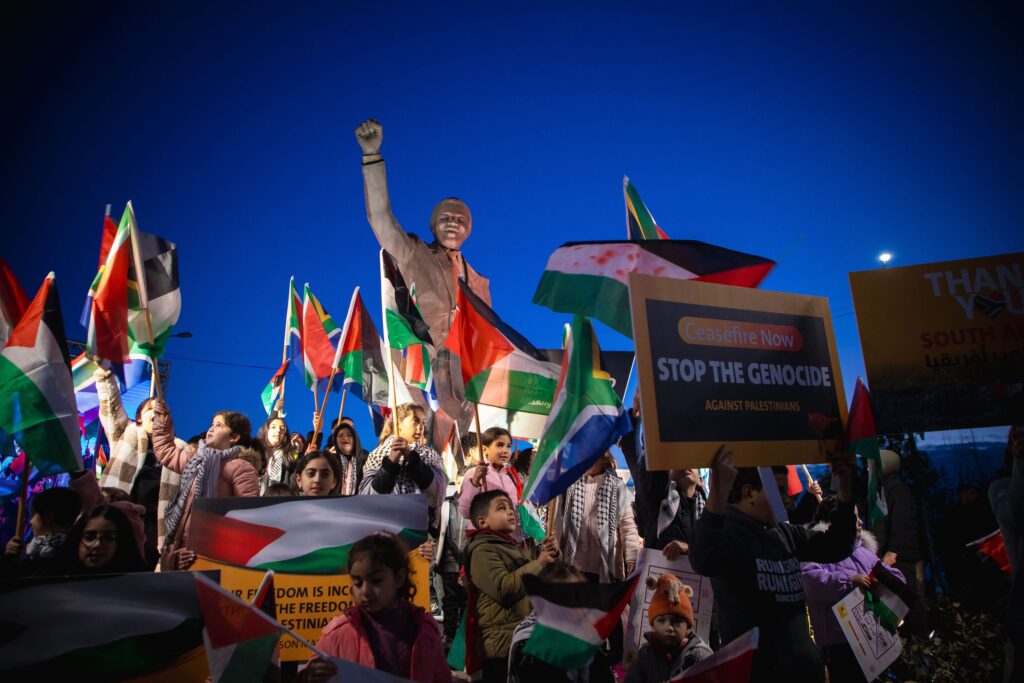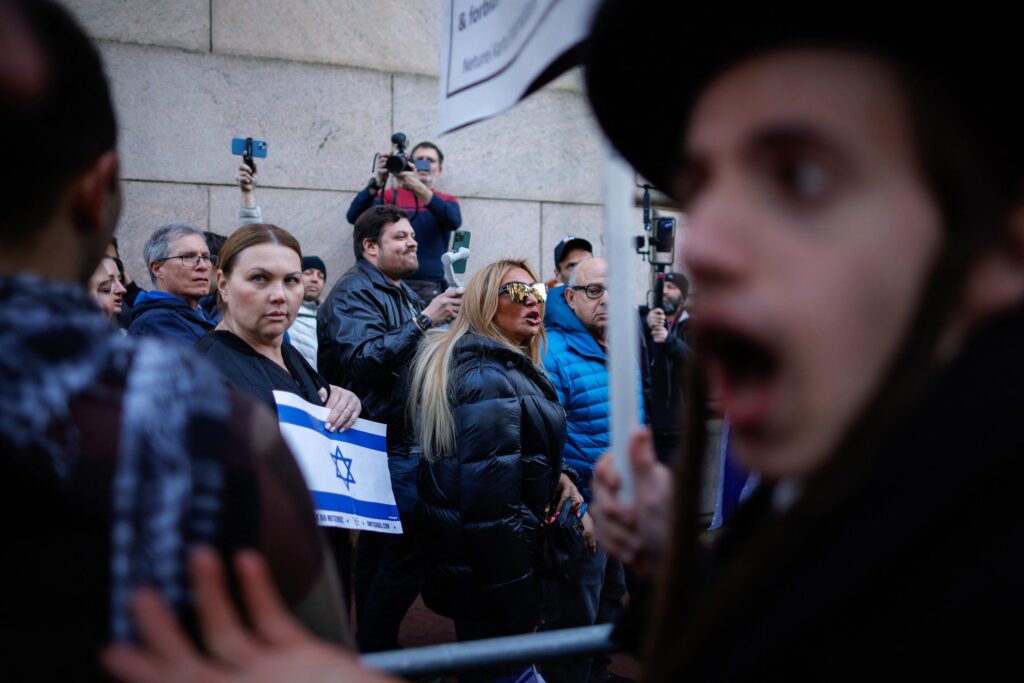The war in Gaza has inspired powerful protest, unyielding contestation, and claims of genocide. In this issue of The Ideas Letter, we solicited three contributions that aim to bring new perspectives to some of the questions thrown up by the conflict.
Mark Mazower, Professor of History at Columbia University—a campus now seen as the ground zero for university protest- considers the conflation of antisemitism and anti-Zionism, with a particular focus on Franklin Foer’s recent essay in The Atlantic on the purported end of a liberal period of prosperity for Jewish Americans. The Nigerian writer and analyst Chris Ngwodo helps to interpret Israel-Palestine through the prism of African history and politics. And Daniel Levy, an erstwhile Israeli negotiator at Taba and Oslo, looks at the protests on U.S. college campuses and explains how the contradictory and dubious representations of the current Gaza war express underlying political struggles, including over antisemitism.
From our curated content we feature a superb explainer from Phenomenal World on the role of money and finance in the global financial system. This is followed by Tobi Haslett’s demolition of Thomas Chatterton Williams’ conceptions of the post-racial. Then, in a profile of economist Glenn Loury, we learn how Loury changed his mind more than once in his intellectual life, even calling a former draft of his memoir, “Changing My Mind.” Lastly, from The Baffler we showcase the concept of “Left melancholia,” Walter Benjamin’s plangent coinage, which looks mournfully at political defeats of the past.
This issue’s musical selection comes from the fine jazz drummer and bandleader Shelly Manne. In 1962 Manne recorded an LP featuring his arrangements of traditional and modern Jewish music, all played in the jazz idiom. Might it inspire hope for the improvisation of a different future for the Middle East? Here’s “Tzena” from Manne’s Steps to the Desert.
—Leonard Benardo, senior vice president at the Open Society Foundations
Foer and Against

Mark Mazower
The Ideas Letter
Essay
Jews have long considered themselves to be on the verge of extinction, despite their remarkable historical endurance. Mazower situates journalist Frank Foer’s recent essay in The Atlantic on the purported end of the “Golden Age” of American Jews within this history and questions the author’s de facto conflation of antisemitism and anti-Zionism. Instead, Mazower argues, outrage at atrocities committed by Israel not just now, but systematically, should be understood in a context of social justice education, and that protests are focused on Israel, not Jews themselves. Constantly invoking antisemitism, he continues, will not thwart a real generational shift away from unquestioning U.S. support for Israel.
“The truth is that Foer’s so-called Golden Age of American Jewry was too good to last. At home, other groups laid claim to their place—with far greater plausibility so far as American history was concerned—in the struggle for victim status. Why, African Americans reasonably asked, was a Holocaust museum built in Washington before there had been any comparable national memorialization of slavery? Why this sense that the Final Solution had been turned into a mass death standard against which all other instances of suffering could be found wanting? Academic debate moved on: the Holocaust of the historians ceased to be a story of unique suffering beyond compare and turned instead into a means of contemplating—and understanding—other genocides past and present. A new generation was born with no memory of the Six-Day War but saw the rise of an extreme pro-settler movement in Israel whose scorn for the Palestinians was palpable. The stage was set for a country, and a generation, both Jewish and not, more willing than their parents to see Israel as something other than a victim or a beacon of hope. The more repressive Israeli policies became in the territories, and the more obvious it seemed that its rightwing administrations were doing what they could to make a two-state solution impossible, the more international support dropped away.”
An African View of Israel’s War in Gaza

Chris Ngwodo
The Ideas Letter
Essay
Israel’s attacks on Gaza, and continued unconditional U.S. support for its ally, demonstrate the hypocrisy of the liberal world order for Ngwodo, who analyzes Israel from an African perspective. He focuses particularly on the ideological alliance between South Africa’s apartheid regime and Israel, arguing that the two—and the United States—might have a particular affinity as settler colonies. South Africa’s history with apartheid undergirds its judicial challenge to Israel in the International Court of Justice. Ngwodo reminds us that African nations have disparate relations with Israel: the African Union has condemned Israel’s response to the Oct. 7 attacks as disproportionate, but there is no unanimity on the continent on the subject of Israel/Palestine.
“Israel is no longer the underdog, and, in truth, it has never truly been. Armed by the United States and Europe, its military superiority in the Middle East has been long established. The ongoing assault on Gaza—the latest and the harshest in a long series of punitive expeditions against the Palestinians purportedly in a bid to destroy Hamas—has exposed the colonial nature of the occupation. When Hamas attacked Israel, there was sympathy from across Africa where many countries are dealing with terrorist threats. But as Israel’s response grew steadily and overwhelmingly disproportionate and careened into the territory of war crimes, that sympathy has been eroded. It is difficult to escape the conclusion that in strategic terms, Hamas is, in fact, winning, while Israel is now reeling from a severe reputational damage.”
Seeing Gaza Clearly

Daniel Levy
The Ideas Letter
Essay
The explosive polarization in the U.S. regarding the representation of events in Gaza and subsequent responses on U.S. campuses is not surprising and, for Levy, belies a fairly simple story: a protest movement that builds on a rich history of civil organizing is pushing back against atrocities funded by U.S. taxes. But the case is complicated by Israeli exceptionalism, the culture war, contestation over definitions of antisemitism and U.S. policy towards Israel/Palestine, and the internal struggle of Jews questioning Zionism. Levy also points to a fifth area of contestation within Palestinian circles around defining their own struggle for liberation.
“There has been a decades long attempt to define a new antisemitism in ways which boost the authoritarian anti-intellectual agenda, close down space for debate on Israel-Palestine, and delegitimize one side of the internal Jewish debate. Its centerpiece became the so-called IHRA definition and examples of antisemitism, refracting Jewish interests through the prism of Israeli interests. Not only did that effort criminalize Palestinian, Jewish and other non-Zionist/anti-Zionist organizing, it also increasingly emptied the accusation of antisemitism of meaning and by default strengthened an already insurgent hard right. As the Israel advocacy spin-off benefits scaled new heights, the fight against actual antisemitism has not been going so well.”
New World Order?
Kate Mackenzie and Tim Sahay
Phenomenal World
Article
In the current dysfunctional global financial system, money flows from the neediest countries to the wealthiest. This results in developing economies making exorbitant interest payments, cutting spending on crucial sectors, and leaving half of the world’s poorest countries even poorer than before the pandemic. A polycentric financial framework has emerged, a decentralized system where various entities such as central banks, multilateral lenders, and regional alliances, provide liquidity and support to countries, particularly during crises, without a formal overarching structure. This is a response to the imbalanced global financial system and aims to address the needs of developing countries that struggle with debt and financial distress.
“World money has always been geopolitical, as political economist Mona Ali has argued. The global dollar system, headquartered in New York and London, is a “money-military matrix backed by legal armature. Most of the non-US arrangements amount to workarounds that are still in service of dollar-based obligations; extending them a little further than US politics would allow for, and with a few less strings than the IMF might demand. The dollar system’s solidity is largely based on the preferences and needs of global elites. Flexing underneath and against that system is likely to continue to be of a limited and ad-hoc nature—more about shielding from disaster and protecting interests than about upending the financialized global dollar system.”
Further Reading
Modelling injustice: South experts call for climate model paradigm shift
Rishika Pardikar, African Arguments
“A growing body of scientists and experts in the Global South are calling for what they see as ‘blinkered’ and ‘neo-colonialist’ assumptions in climate change mitigation models to be addressed. They argue that scenarios presented by the Intergovernmental Panel on Climate Change (IPCC), which inform policy at the national and global level, project unequal futures where developing countries remain poor for decades.”
Irrational Man
Tobi Haslett
Book Forum
Essay
Haslett analyzes Thomas Chatterton Williams’s argument for a post-racial society, as presented in his book Self-Portrait in Black and White: Unlearning Race. The author argues that Williams’s narrative is incoherent, relying on personal anecdotes and intellectual gymnastics rather than solid arguments, and fails to address the complexities of race and racism, particularly in relation to class and collective struggle.
“The fact is that “race” is made and remade at the vicious, jam-packed crossroads of class stratification and the force of the state—which is one reason why, as Williams notes with uncomprehending triumph, different countries have different racial paradigms. What he cannot grasp is that any effective challenge to white hegemony would have to take place not in the perfumed realm of private choices and elective affinities, but on the harsh terrain of real life: where collective struggle is waged, and wealth is made and spread. Apart from a single glancing mention (in parentheses) of the social democrat Bernie Sanders, there is no serious and explicit treatment of the gap between rich and poor. The omission reveals the fantasy that throbs beneath this memoir: that race can be yanked from the clanging machinery in which it’s lodged. Nothing could be more reassuring. No other hierarchy—not the advantages that, say, one gender or class lords over the others—will have to change or be abolished, as Williams attempts to leap through his little trapdoor in history.”
Glenn Loury Comes Clean
Evan Goldstein
The Chronicle of Higher Education
Article
Black public intellectual Glenn Loury’s new memoir Late Admissions contains candid details of a life in the ivory tower and Boston drug dens. Loury has “spent decades in the thick of rancorous debates on race and inequality, affirmative action and identity politics, crime and punishment” and has been embraced by conservatives, liberals and conservatives again as his position on race favored one side or the other’s narrative.
“But even if speech isn’t free, Loury has been unique in his willingness to pay any price, and zealous in his refusal to conform. He is the Ivy League professor who rubbed shoulders with the downtown hustlers, the Black scholar who ran with the Reaganites, the reformed Reaganite who broke ranks with former friends, the repentant progressive who stands in opposition to Black Lives Matter; and now, he is the eminent scholar dishing the sordid details of a complicated life. That guy is biting his tongue?!”
Beyond Left Melancholy
Hannah Proctor
The Baffler
Essay
Proctor explores the psychological toll of political defeat for leftist movements, particularly focusing on the aftermath of Labour’s losses in the UK’s 2019 general election. She critiques the concept of “left melancholy,” which she describes as a mourning for a past idealized left-wing movement, arguing that this perspective fails to address the emotional and experiential aspects of defeat. Instead, she suggests a need to acknowledge the pain of loss but also maintain a commitment to political organizing and change.
“In Benjamin’s description, the feelings of the left melancholic once lay in “dusty heart-shaped velvet trays” that are now empty, while Brecht describes revolutionary hearts that have been broken but remain full of feeling. The sliver of difference between the empty heart and the broken one may seem negligible, but it is the difference between resignation and commitment. A counterpart to left melancholia, which is characterized by a stubborn attachment to a thwarted future, might be mournful militancy. The latter not only responds to the losses and harms inflicted by social injustice in the past by struggling to make the future more livable but also acknowledges that the process of mourning requires time and space in the present to work through loss, contend with ambivalence, and sit with grief. The famous words of Industrial Workers of the World organizer Joe Hill have become something of a slogan on the left: ‘Don’t mourn, organize!’ But perhaps this needs to be replaced by a more emotionally complicated injunction: ‘Mourn, organize!’”
